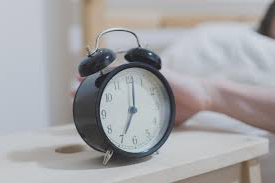To Snooze or Not to Snooze

(Google Common License)
When you wake up in the morning, do you jump out of bed at the sound of your alarm? Or do you snooze the alarm for an extra 5, 10, or 15 minutes of sleep? Everyone that has to wake up early has their own routine, but if yours includes snoozing your alarm you could really be hurting rather than helping yourself. This process of “dipping in and out of sleep in the early morning” is known as “drockling” according to Mary Carskadon, professor of human behavior at Brown University, and it’s a habit that you need to break!
Snoozing the alarm in the morning does feel amazing, at first. As you wake up, “your body has several mechanisms to prepare you to wake up,” but they take time, says Rafael Pelayo, a sleep specialist at Stanford University (Pikul). Your core temperature begins to raise two hours before waking up, which “makes you feel more alert and less sleepy” (Pikul). However, if your alarm goes off before your temperature has begun to rise it makes your warm bed that much more comfy and the snooze button that much more enticing.
However, snoozing can actually make you feel more tired as you wake up and it then affects your whole day. When your alarm first rings your body begins to wake up, but when you let yourself go back to sleep, “your body thinks, ‘False alarm!’ … and settles in” (Pikul). Then when your alarm goes off again, and again, “Pelayo says that your body and brain are taken by surprise, resulting in… sleep inertia” (Pikul). This state makes you feel groggy and fuzzy and “can persist for up to two to four hours, research has found” (Pikul). The inconsistency “causes your brain to become confused … and messes with your body clock” (Young). While the warm cocoon of your bed may feel amazing, those extra ten minutes aren’t worth a bleary and unproductive morning.
To combat sleep inertia, follow these simple rules. First and foremost, get up when your alarm goes off! It will also help to get up at the same time everyday because “if you’re not waking up at the same time everyday, your body doesn’t know when to start feeling sleepy” (Pikul). It has been proven that “this consistency … [helps] you feel naturally sleepy at the end of your day” making it easier to get to bed with enough time for a good sleep. Also, if you feel too tired to start your day in the morning,you probably didn’t get enough sleep, “ so start by making sure you get the recommended seven to nine hours” of sleep (Young). If you are having difficulty falling asleep, there are also plenty of things to help, like drinking warm and relaxing tea, listening to soothing music, or reading for a little before you go to bed.
Works Cited
https://www.huffingtonpost.com/2014/08/01/why-hitting-snooze-is-bad-for-health_n_5630707.html (Pikul)

Mamie • Nov 25, 2017 at 1:53 pm
This article was really interesting and helpful because getting up in the morning is definitely a struggle for most students. It does a really good job of summarizing the research that shows how harmful snoozing in the morning can be. I will definitely reconsider hitting the snooze button in the morning from now on given the knowledge of how detrimental it can be to an entire morning. Although snoozing in the morning seems like a great idea in the short term, in the long run it is unhealthy and a bad habit.